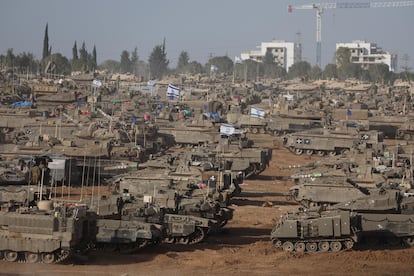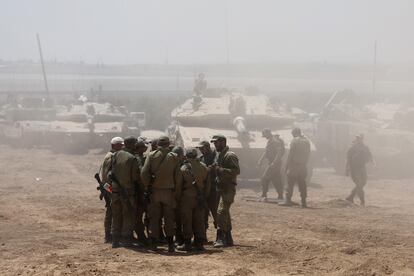US weapons, the key to Israel’s military supremacy in the region
The United States is by far the country’s leading arms supplier, providing Israel with cutting-edge technology


The United States has historically been Israel’s main weapons supplier. Imports of U.S. material, including high-tech armaments, have been the key to Israel’s military primacy in the Middle East. For decades, arms sales to Israel have been unquestioned. That’s why the decision of U.S. President Joe Biden to paralyze the shipment of offensive weapons to Israel if it undertakes a large-scale operation in Rafah, in the south of the Gaza Strip, is a qualitative change in the relationship between both countries.
To make the message clear, following weeks of fruitless talks in which the government of Israeli Prime Minister Benjamin Netanyahu failed to listen to U.S. concerns over Rafah, Biden decided last week to pause the first delivery. This was a shipment of 3,500 munitions: 1,800 900-kilogram bombs and 1,700 225-kilogram bombs. Biden — who complained a few months ago about Israel’s “indiscriminate bombing” — acknowledged Wednesday in an interview with CNN that “civilians have been killed in Gaza as a consequence of those” American bombs.
In the interview, Biden said that the invasion of Rafah “is just wrong.” “If they go into Rafah, I’m not supplying the weapons,” he said, making it clear that shipments of lethal weaponry will be halted. “We’re not going to supply the weapons and the artillery shells,” said Biden. “I’ve made it clear to Bibi [Netanyahu] and the war cabinet: They’re not going to get our support, if in fact they go on these population centers.”

The suspended shipment was not due to arrive in Israel for a few weeks, so in material terms it is not decisive in preventing a short-term operation in Rafah. But it is a warning from Israel’s main weapons supplier. According to a recent report by the Stockholm International Peace Research Institute (SIPRI), the United States accounted for 69% of imports of Israel’s main conventional weapons between 2019 and 2023.
According to State Department data, since the creation of Israel in 1948, the United States has provided it with more than $130 billion in bilateral aid focused on countering threats, security cooperation, interoperability through joint exercises and helping Israel maintain its so-called “qualitative military edge” — which Washington has assumed by law as its own obligation. That clause is important. In fact, in quantitative terms, according to SIPRI data, in the Middle East alone, the United States sold more weapons to Saudi Arabia, Qatar, and Kuwait than to Israel between 2019 and 2023.
U.S. aid to Israel has helped make its military one of the most powerful and effective in the world. A program negotiated nearly a decade ago is currently in force. In September 2016, then-president Barack Obama reached an agreement with Netanyahu, in which the United States committed to providing $38 billion in military aid to Israel over a period of 10 years. This includes $3.3 billion annually in weapons and an additional $500 million for Israeli air defense systems.

Fighter jets
Israel has used those funds to order 75 F-35 fighter jets, a plane undetectable by radar and considered the most advanced ever manufactured. Thanks to Washington’s commitment to ensure Israel maintains its “qualitative military edge,” Israel was the first country other than the United States to receive an F-35 and was also, in fact, the first to use it in combat. It already has 30 of these planes, and Washington has approved the delivery of new units.
Last October, when the State Department last took stock, the United States had 599 active arms sales operations to Israel valued at $23.8 billion, some of which require congressional approval. Among the priority initiatives were the F-35; CH-53K heavy lift helicopters; KC-46A aerial refueling tankers; and precision-guided munitions.
From FY 2018 through FY 2022, the United States also authorized the permanent export of more than $12.2 billion in defense articles to Israel via the Direct Commercial Sales process. In those operations, Israel primarily purchased guided missiles, ballistic missiles, rockets, torpedoes, bombs and mines, aircraft, gas turbine engines and launch vehicles.
Since the Hamas attacks last October, the Biden government has been supplying weapons covered by previous authorizations or in dozens of shipments that did not require authorization due to their size. The president also announced two additional operations in which he bypassed congressional approval by invoking emergency authority. In December, the White House approved the sale of nearly 14,000 rounds of tank ammunition and equipment to Israel, worth $106.5 million, and the sale of 155-millimeter caliber artillery shells and related equipment worth $147.5 million.
Biden said on Wednesday that even if he stopped sending bombs, howitzers and other lethal weapons, the United States would continue supplying defensive weapons to Israel. “We’re going to continue to make sure Israel is secure in terms of Iron Dome and their ability to respond to attacks that came out of the Middle East recently,” he stated.

In the U.S. military aid package approved in March — which provided funding to Ukraine, Israel and Taiwan — the Israeli package prioritized defensive capabilities, providing $5.2 billion to replenish air defense systems such as the Iron Dome and David’s Sling. These systems are designed to intercept rockets, drones, missiles, planes and projectiles fired against its territory. Another $3.5 billion was allocated to the acquisition of advanced weapons systems through the Foreign Military Financing Program: $1 billion to improve the production and development of artillery and ammunition and $4.4 billion to replenish defense supplies and services.
Biden’s decision to halt weapons shipments is the biggest military disagreement between the U.S. and Israel since the first Lebanon war in 1982. In that conflict, president Ronald Reagan suspended the delivery of cluster bombs and other weapons. The previous year, it also decided to withhold the delivery of combat aircraft.
The United States has been the key military supporter of Israel, which claims that it can go ahead with its plans without U.S. support. The White House maintains that it is still hopeful that the Netanyahu government will not decide to invade Rafah. “That’s a choice that Israel will have to make,” National Security Council spokesman John Kirby said Thursday. “And it’s one we hope they don’t.”
Sign up for our weekly newsletter to get more English-language news coverage from EL PAÍS USA Edition
Tu suscripción se está usando en otro dispositivo
¿Quieres añadir otro usuario a tu suscripción?
Si continúas leyendo en este dispositivo, no se podrá leer en el otro.
FlechaTu suscripción se está usando en otro dispositivo y solo puedes acceder a EL PAÍS desde un dispositivo a la vez.
Si quieres compartir tu cuenta, cambia tu suscripción a la modalidad Premium, así podrás añadir otro usuario. Cada uno accederá con su propia cuenta de email, lo que os permitirá personalizar vuestra experiencia en EL PAÍS.
¿Tienes una suscripción de empresa? Accede aquí para contratar más cuentas.
En el caso de no saber quién está usando tu cuenta, te recomendamos cambiar tu contraseña aquí.
Si decides continuar compartiendo tu cuenta, este mensaje se mostrará en tu dispositivo y en el de la otra persona que está usando tu cuenta de forma indefinida, afectando a tu experiencia de lectura. Puedes consultar aquí los términos y condiciones de la suscripción digital.








































